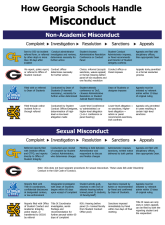Recent controversies over Tech’s disciplinary processes have called into question those of the entire University System of Georgia (USG). Multiple legislators, including Representative Earl Ehrhart of Cobb County, are calling for an overhaul
of the student disciplinary system at Tech, and the state Board of Regents (BOR) is currently developing new guidelines for both non-academic and sexual misconduct. These new guidelines will likely be unveiled within the next month, but until their release, each USG school must continue to follow the current guidelines set by the BOR and the federal government.
The BOR sets guidelines for certain elements of the disciplinary process within their policy manual, more specifically in sections 4.6 and 4.7.
Section 4.6, titled “Discipline of Students,” is bookended by policy outlines for alcohol and drugs for on campuses and in campus organizations. These sections, 4.6.1 and 4.6.4, comprise the majority of the section’s text.
Section 4.6.2, “Violations of State or Federal Law,” dictates that any
student charged with or indicted for such a crime may be suspended until their disposition is complete. The student may request a hearing in which they attempt to demonstrate the value of their continuing presence on campus, but should the student be convicted, he or she may also be subject to disciplinary action within their educational institution.
Section 4.6.3, “Disruptive Behavior,” essentially states that any student or students who disrupts or obstructs the activities of their USG institution will be subject to disciplinary action and possibly dismissal.
Section 4.7 is focused on the appeals process, with 4.7.1 outlining the final authority of institution presidents in campus matters, with the only way to appeal this authority lying with the BOR.
However, whether to review an appeal or not is completely at the BOR’s discretion and is largely determined by whether an issue has system-wide ramifications.
Section 4.7.2 redirects readers to section 8.6, which provides instructions for appealing to the BOR and overviews the review process should the BOR choose to entertain the appeal.
Other guidelines set by the BOR have been set through precedent in prior cases and are not explicit in the policy manual.
Title IX, which only explicitly prohibits discrimination on the basis of sex in educational institutions, has been inferred to cover incidents of sexual misconduct in recent years.
A 2011 “Dear Colleague” letter published by the U.S. Department of Education outlines how schools need to investigate issues of sexual misconduct; for example, a Title IX coordinator well-versed in investigating such matters must be present on campus, and while there do not need to be separate procedures for sexual misconduct cases, it is required that said systems provide a complainant a “prompt and equitable solution.”
The “Dear Colleague” letter does not technically constitute law but is nonetheless enforced similarly with federal investigations and the potential loss of federal funding.
Harvard Law, for example, had to reconfigure its sexual misconduct system in 2014 after it became apparent that it was not using the prescribed “preponderance of evidence” standard in its hearings, but rather the higher standard of clear and convincing evidence.
Each USG institution is required to meet the requirements set by the BOR but has some liberties in how precisely they implement their procedures.
Tech, the University of Georgia (UGA), Georgia State University (GSU) and Kennesaw State University (KSU) each have mechanisms in place to impose interim actions on students during the investigation process. Each institution furthermore briefs students on who and what will be presented at their hearings at least three days in advance; Georgia State, however, is the only institution which explicitly includes an outline of due process rights.
All four of these schools allow students entering a hearing to have an advisor present for moral support and guidance, though whether this advisor can be a parent, student, faculty member or lawyer is completely dependent on the institute in question.
UGA, for example, employs an organization called the University Judiciary to supply hearings with student advisors to respondents and student advocates to present the university’s case. Tech, on the other hand, allows students to choose any peer, faculty or family member to advise them in the hearing process so long as that person is not an attorney.
Each institution has additional, supplementary procedures for academic misconduct and incidents involving drugs and alcohol.

